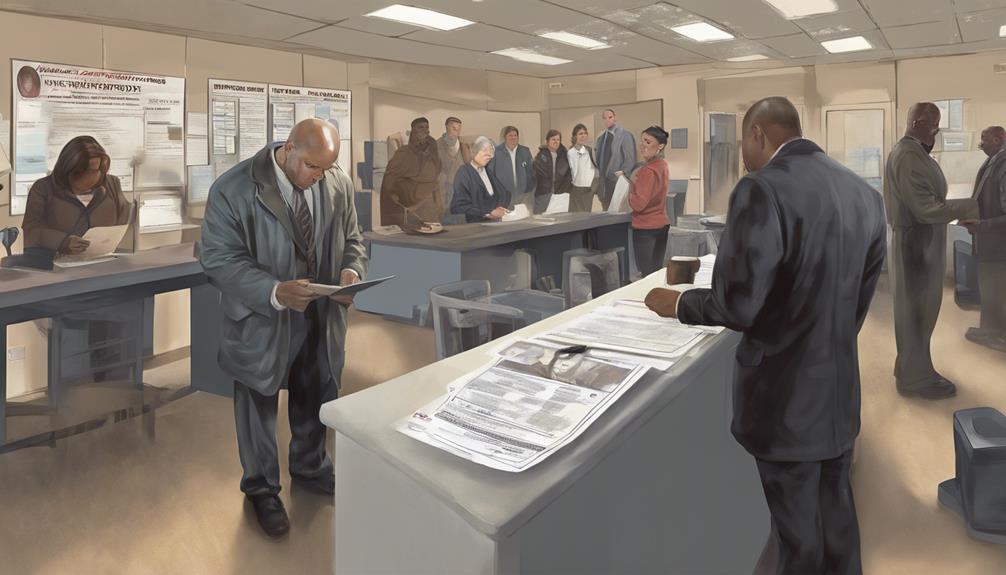E-Verify verifies work eligibility by comparing Form I-9 with government records but doesn't conduct thorough background checks like criminal history or credit reports. It prioritizes confirming work authorization within three days of hiring. If seeking information on E-Verify's role, it's valuable to understand its limitations and the importance of background screenings for a thorough assessment.
Key Takeaways
- E-Verify solely verifies work eligibility, not conducting comprehensive background checks.
- Background checks explore criminal history, credit reports, and personal information separately.
- Employers should complement E-Verify with reputable Consumer Reporting Agencies for thorough screenings.
- E-Verify is mandated to confirm work authorization, not for detailed background investigations.
- Background checks are crucial for risk mitigation, ensuring a safe work environment, and verifying qualifications.
Key Differences Between E-Verify and Background Checks

What sets E-Verify apart from traditional background checks in the hiring process?
E-Verify is a system used by employers to verify employment eligibility by comparing Form I-9 data with government records, ensuring work authorization. On the other hand, background checks explore an individual's criminal history, credit report, and other personal information to assess their suitability and past behavior.
While E-Verify is mandated by federal laws for certain employers like federal contractors to prevent unauthorized employment, background checks are utilized for various purposes such as risk mitigation and ensuring a safe work environment.
E-Verify is typically used within 3 days of hiring to confirm work authorization, providing Employment Authorized or Tentative Nonconfirmation notices based on data matching. In contrast, background checks offer detailed information beyond work authorization, including criminal records and credit history.
Employers should understand the distinct roles of E-Verify for verifying employment eligibility and background checks for thorough candidate assessments to make informed hiring decisions.
E-Verify Forms and Paperwork Process
E-Verify forms and paperwork require specific documentation to verify employee work eligibility accurately.
Employers must follow a structured process for submitting the necessary paperwork to complete the verification procedure efficiently.
Adhering to these requirements helps prevent risks associated with hiring unauthorized workers and guarantees compliance with employment eligibility regulations.
E-Verify Documentation Requirements
Employers must attentively comply with specific documentation requirements when navigating the E-Verify forms and paperwork process to validate their employees' work eligibility. To guarantee a thorough and accurate verification process, employers need to:
- Provide E-Verify documentation: Employers must input Form I-9 information accurately into the E-Verify system for employment eligibility verification.
- Confirm legal work authorization: E-Verify is utilized to confirm that employees have the legal right to work in the United States.
- Prevent risks: Completing E-Verify forms helps in ensuring that employee information is verified accurately, reducing potential risks associated with non-compliance.
- Supplement background checks: While E-Verify focuses on work eligibility, it doesn't investigate personal information like criminal records or credit history, which are covered in thorough background checks.
Employers utilizing E-Verify should pay close attention to these documentation requirements to maintain compliance and verify their employees' eligibility to work legally.
Paperwork Submission Process
Efficiently managing the paperwork submission process for E-Verify involves accurately inputting employee information for instant work authorization verification. By completing E-Verify forms and comparing the data with Form I-9, employers can guarantee that their employees have valid work authorization.
This verification process is essential in enhancing the accuracy of employment eligibility checks and reducing risks associated with unauthorized workers.
Submitting paperwork through E-Verify eliminates concerns about fake documents or inaccuracies in the hiring process. It provides a streamlined way to confirm employees' work authorization status promptly, contributing to a more secure and compliant workforce.
Additionally, E-Verify serves as a protective measure for businesses, helping them mitigate potential liabilities related to unauthorized employment.
E-Verify Compliance Guidelines Overview

Guidelines for utilizing the E-Verify system outline specific requirements for confirming work authorization within a set timeframe. Employers must adhere to these guidelines to ensure compliance with federal laws and maintain the security of their workforce.
Here are some key points related to E-Verify compliance:
- Timely Usage: Employers are required to use E-Verify within three days of a new hire's start date to verify their employment eligibility.
- Data Verification: The system compares employee information from Form I-9 with records from the Department of Homeland Security (DHS) and the Social Security Administration (SSA) to confirm work authorization.
- Legal Mandates: E-Verify is mandated for federal contractors and may be required in specific states to prevent unauthorized employment.
- Supplementary Checks: While E-Verify is essential for verifying work eligibility, employers should also consider utilizing a background screening company for thorough employee screening.
Understanding Background Check Importance
Understanding the importance of background checks extends beyond the scope of E-Verify, providing a more detailed assessment of an individual's personal and professional history. Background checks are essential to confirm a candidate's information, work history, and qualifications, guaranteeing that they meet the requirements of the position and comply with relevant laws. Unlike the one-time E-Verify process, background checks can be conducted multiple times for different roles or updates, offering a complete view of an individual's background.
To highlight the significance of background checks, consider the following table:
| Significance of Background Checks |
|---|
| Verify information accuracy |
| Ensure adherence to laws |
| Confirm work experience |
| Assess qualifications |
Employers must conduct background checks to safeguard their organization, uphold legal standards, and make informed hiring decisions. By utilizing reputable Consumer Reporting Agencies (CRAs) for background screenings, employers can conduct thorough checks that comply with regulations, ultimately reducing risks associated with inadequate vetting processes.
E-Verify Limitations and Proper Usage

E-Verify serves as a valuable tool for confirming work eligibility but falls short in conducting thorough background checks. Employers must understand the limitations of E-Verify, such as not screening for criminal history, and should utilize it within the appropriate timeframe after hiring.
To guarantee a thorough vetting process, employers should complement E-Verify with additional background screening services from reputable companies.
E-Verify and Background Checks
How does E-Verify differ from traditional background checks regarding employment eligibility verification?
E-Verify focuses on confirming the legal eligibility of individuals to work in the U.S. by comparing Form I-9 data with government records, while traditional background checks encompass a broader scope of information such as criminal history and credit checks.
Here are some important considerations regarding E-Verify and background checks:
- Specific Purpose: E-Verify is tailored for verifying employment eligibility only.
- Not All-encompassing: It doesn't substitute all-inclusive background screenings that include criminal and credit history checks.
- Timing: Employers must complete E-Verify within three days of hiring to confirm legal work eligibility.
- Engaging CRAs: For thorough background checks beyond E-Verify, employers should involve Consumer Reporting Agencies (CRAs).
Employers should utilize E-Verify as a tool for confirming employment eligibility but must engage with CRAs for a thorough evaluation of potential employees.
Limitations of E-Verify
Employers utilizing E-Verify for verifying employment eligibility should be aware of the limitations associated with its usage. While E-Verify is a useful tool to confirm an individual's legal right to work in the United States, it is crucial to understand its constraints. One key limitation is that E-Verify does not check an individual's criminal history; it solely focuses on verifying work eligibility. Employers must use E-Verify within three days of an employee accepting a job offer and cannot use it later than the third business day after the employee starts working. It is essential to note that E-Verify is not suitable for conducting comprehensive background checks on employees. Additionally, employers should not use E-Verify for pre-screening or checking criminal backgrounds as it is not designed for such purposes. Understanding these limitations is vital to ensure proper usage and compliance with consumer reporting regulations.
| Limitation | Description | Importance |
|---|---|---|
| Does not check criminal history | Focuses solely on verifying work eligibility | Ensures legal right to work in the United States |
| Must be used within three days of job offer acceptance | Ensures timely verification of employment eligibility | Compliance with legal requirements |
| Not designed for comprehensive background checks | Employers should not rely on it for extensive background screening | Avoids misuse of the system |
Proper Usage Guidelines
Understanding the constraints of the system is crucial for promoting appropriate utilization of E-Verify. Employers must adhere to federal laws that regulate the system to maintain compliance and integrity.
Here are four key points to keep in mind when using E-Verify:
- E-Verify doesn't check an individual's criminal history: It's important to remember that E-Verify focuses solely on verifying employment eligibility, not conducting thorough background checks.
- Timely usage is essential: Employers must use E-Verify within three business days of hiring, emphasizing that it's intended for post-hiring verification and not pre-employment screening.
- E-Verify is an HR onboarding tool: Proper usage guidelines dictate that E-Verify is a vital step in the onboarding process, ensuring legal eligibility to work in the U.S., and not a tool for pre-screening or background checks.
- Consult legal advice if needed: For complex cases or uncertainties, seeking legal guidance regarding the appropriate use of E-Verify can help navigate potential challenges and ensure compliance with relevant federal laws and the system's Privacy Policy.
Seeking Reliable Background Check Services
When sourcing reliable background check services, opting for a trusted Consumer Reporting Agency (CRA) is crucial. Consumer Reporting Agencies (CRAs) play a pivotal role in conducting thorough background screenings for employees. These agencies can provide detailed checks that cover criminal records, employment history, credit reports, and more, ensuring that employers have a full picture of a candidate's background.
CRAs also assist in navigating the complex legal landscape surrounding background checks, helping companies stay compliant with regulations set forth by Homeland Security and other governing bodies. While E-Verify can verify an individual's eligibility to work in the U.S., it isn't a substitute for the extensive analysis provided by CRAs.
Employers should consider utilizing both E-Verify and CRAs in tandem to obtain a well-rounded perspective on potential hires. By prioritizing the engagement of a reputable CRA, businesses can make informed decisions when it comes to their hiring processes.
Employee Rights and E-Verify Recommendations

Employee empowerment through knowledge and advocacy is pivotal when maneuvering E-Verify procedures and safeguarding rights in the workplace. To guarantee employees are informed and protected, they should:
Exercise Employee Rights: Employees have the right to challenge E-Verify findings and address non-confirmations within 8 days. Employers must provide specific notices related to E-Verify.
Avoid Retaliation: Retaliating against employees for E-Verify-related actions is illegal. Employees should seek legal advice if they face repercussions.
Ensure Form I-9 Accuracy: It's essential for employees to verify the accuracy of Form I-9 documentation to prevent issues with E-Verify.
Report Discrimination: If employees face discrimination related to E-Verify, they've the right to file complaints. The Department of Homeland Security takes discrimination complaints seriously to protect employee rights.
Frequently Asked Questions
Is E-Verify Used for Background Check?
E-Verify is not used for traditional background checks. It verifies employment eligibility by comparing Form I-9 data with government records. Background checks encompass criminal records and personal details not covered by E-Verify. Employers should engage reputable screening companies for thorough checks.
What Does an Employer See on E-Verify?
Employers using E-Verify see a confirmation of employment eligibility based on Form I-9 and government records. It does not show criminal or credit history. Results are Employment Authorized or Tentative Nonconfirmation, focused on work authorization only.
Can E-Verify Be Used to Pre Screen Applicants?
When considering pre-screening applicants, it is essential to understand that E-Verify is designed for verifying employment eligibility post-offer acceptance. For thorough screenings, employers should engage reputable background screening companies or CRAs for background checks.
What Is the Difference Between Verification and Background Check?
Verification confirms legal eligibility for work. Background checks evaluate personal history for suitability. While verification uses government records for instant results, background checks, including criminal, credit, and driving records, require more time for processing.
Conclusion
To sum up, while E-Verify and background checks serve different purposes, they can be used together to guarantee thorough employee screening.
By understanding the key differences and compliance guidelines, businesses can make informed decisions on their hiring processes.
Remember, it's always best to rely on trustworthy background check services to guarantee accuracy and compliance.
So, why not take the extra step to protect your company and employees?









